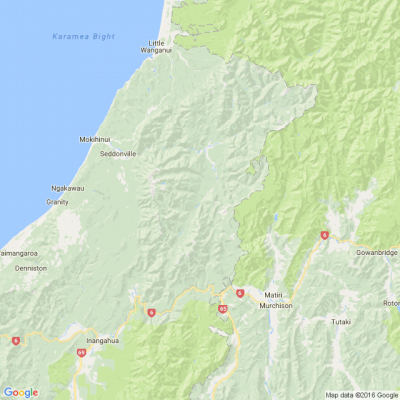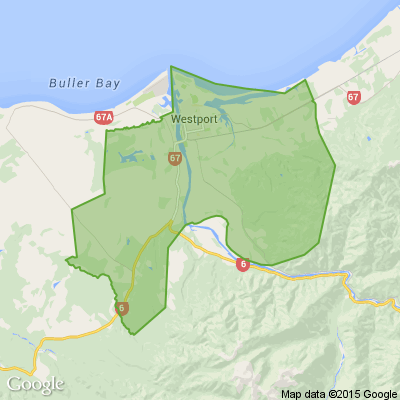Stressed landowners on tenterhooks for Budget confirmation
By local democracy reporter Brendon McMahon:
Flood-stricken landowners and the West Coast Regional Council are on tenterhooks on the promise of new funding for Franz Josef under $400m of new protection money announced in the Budget.
The council's Waiho River south and north banks project has been named as "ready for" the first tranche of the Regional Infrastructure Fund initial allocation in 2024-25.
However, whether the council gets the $10m it has been seeking in the past year in ongoing discussions with Government officials is not yet clear.
Council chief executive Darryl Lew initially said on Friday a $6m allocation under the new fund was confirmed.
However, staff later contacted LDR and said they "might have jumped the gun".
Minister Shane Jones' office said they did not know the individual project details and were unable to confirm the West Coast project allocation beyond Thursday's sweeping budget statement.
Lew said he understood council was to get $6m from the fund, predicated on a 40% ($4m) contribution from the landowners across the Franz Josef Special Joint Rating District.
He said bolstering the existing protection on the Waiho River south side and installing a flood forecasting and warning system was the primary focus of their $10m scheme.
A portion would also add protection for the north bank Franz Josef sewage ponds site - pending a district council decision to move the ponds, Lew said.
The council assured Waiho River ratepayers in April it was still working to secure the release of $8.7m of money previously allocated for the area's flood protection.
The $8.7m was meant to be spent on fixing stop banks on the south side of the river at Waiho Flat after announcement of a broader $24m scheme for the area in 2020.
Subsequently the council announced its 10-year Waiho River Management Strategy in October last year after the previous Government asked for a more detailed case including retreat from the south bank.
Under the strategy, the council proposes better flood warning and protection initially before a retreat from the area in about 10 years.
Lew said the $8.7m had now "gone" and money under the Regional Infrastructure Fund was "new money".
"It is predicated on a 60/40 split," he said.
"The total budget will be $10m of which 40% has to be recovered locally."
He anticipated a special meeting of the joint committee being called first to test "their commitment" to co-funding.
Waiho Flat ratepayers spokesman Dale Straight said stressed landowners on the south bank were hanging for some good news - particularly in the wake of the October announcement.
"There's people there pretty bloody stressed and worried," he said.
If the new funding "comes to pass" then it would be a major boost.
"It's been a pigs ear in the way it's been handled," he said.
"It's got to be good news for the south side, and certainly some of the farms further down the valley that are not really covered by any protection at all."
However, Straight said ratepayers may not feel able to financially commit to co-funding given the drawn out process they had endured for years.
"We had that nearly $8.7m promised four years ago that then got 'unpromised'. This may go someway to replace that I suppose."
Straight said the promise of "money for nothing" still had a price which might be "a big noose around our necks".
"There's a bit of water to go under the bridge yet."
Lew said the new money was aligned with the first two prongs of the 10-year Waiho River Management Strategy.
That was to immediately bolster civil defence and flood warning for the people living there, and to bolster the existing protection banks.
It would still be to "buy time" before an eventual staged retreat from the river's south bank, as announced in October.
Poll: Should the government levy industries that contribute to financial hardship?
As reported in the Post, there’s a $30 million funding gap in financial mentoring. This has led to services closing and mentors stepping in unpaid just to keep helping people in need 🪙💰🪙
One proposed solution? Small levies on industries that profit from financial hardship — like banks, casinos, and similar companies.
So we want to hear what you think:
Should the government ask these industries to contribute?

-
60% Yes, supporting people is important!
-
25.7% No, individuals should take responsibility
-
14.3% ... It is complicated
A Neighbourly Riddle! Don’t Overthink It… Or Do?😜
Do you think you know the answer? Simply 'Like' this post if you know the answer and the big reveal will be posted in the comments at 2pm on the day!
If you multiply this number by any other number, the answer will always be the same. What number is this?

Have you got New Zealand's best shed? Show us and win!
Once again, Resene and NZ Gardener are on the hunt for New Zealand’s best shed! Send in the photos and the stories behind your man caves, she sheds, clever upcycled spaces, potty potting sheds and colourful chicken coops. The Resene Shed of the Year 2026 winner receives $1000 Resene ColorShop voucher, a $908 large Vegepod Starter Pack and a one-year subscription to NZ Gardener. To enter, tell us in writing (no more than 500 words) why your garden shed is New Zealand’s best, and send up to five high-quality photos by email to mailbox@nzgardener.co.nz. Entries close February 23, 2026.










 Loading…
Loading…





